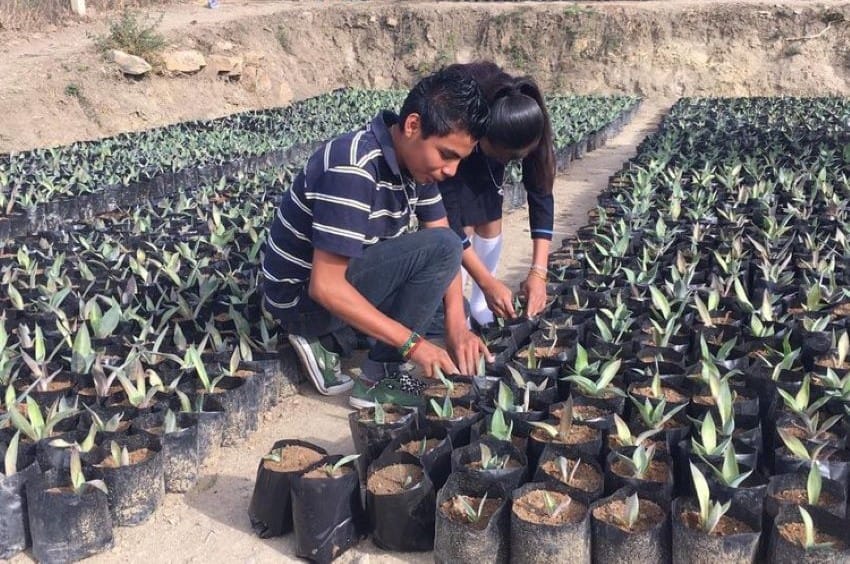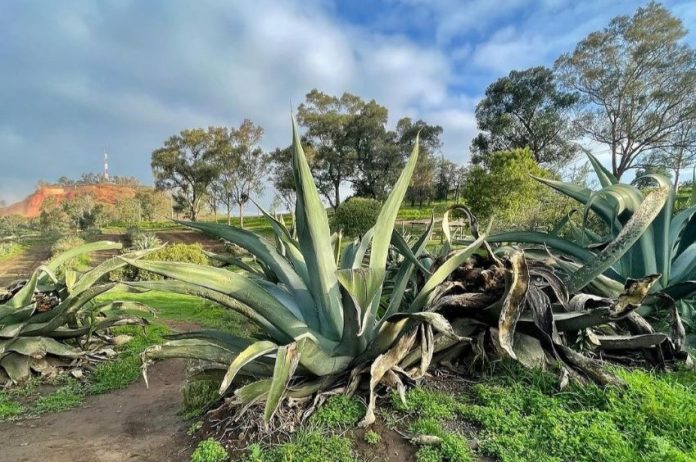Drinking responsibly doesn’t just mean drinking and not driving anymore — in 2024, it also means supporting sustainability. We don’t have the time (or often, the desire) to meticulously research the spirits companies that we buy from, and we aren’t experts and have to trust the word of the companies themselves — which isn’t always as honest as we’d like.
There are now non-profits on the ground in Mexico who are working to change this. Agave expert Lou Bank discusses SACRED, and how they have worked to transform lives and promote sustainability in Mexico’s rural mezcal industry.
Meet Lou Bank, mezcal expert extraordinaire
The past few years my writing (and my palate) have led me to the rural Mexico, and its fields of agave. I have learned about the effects of climate change, over-consumption, capitalism, and loss of biodiversity that threaten mezcalerías and its traditional distilleries.
Bank started to hear similar stories in the 2010s when he was visiting small, family-run operations.
“It doesn’t take long for you to start recognizing that really, all the resources they need to make mezcal are at risk as the market grows. And as the bigger players get into it, you’ve got agave, and land that is starting to become more scarce. And then you add trees on top of that, because they use the wood to cook with, and then you add to that water,” he explained.
“And local workers are being poached by the larger multinational companies trying to scale up their productions. So increased mezcal consumption puts so much pressure on local families and their ability to continue doing what they’re doing, the way they’ve been doing it for multiple generations.”
Helping communities who need support most

As a fan of mezcal and an experienced non-profit fundraiser, Bank wanted to do something to help. During his travels in 2011, a mezcal maker he befriended approached him about raising funds for a local library, and Bank was struck with the idea that there were needs to be met in every community he visited. So he started to ask what they were.
“These families who continue carrying on these traditions in the face of all of these changes, they’re the ones who are going to be able to figure out how to solve the problem. What I can do is access resources for them, primarily monetary resources, but not exclusively, as they’re looking for resources to implement solutions to their problems. I want to be able to help them when they ask for it,” Bank said.
Thus began SACRED, an organization working with mezcaleros and their communities to raise funds for community-led solutions in rural Mexico. The nonprofit has so far helped to fund a library, six agave nurseries, four water catchment systems, and a community plaza/basketball court. They have also distributed more than 60,000 agave seedlings to local families that needed them for their mezcal production.
The sustainable agave of the future
The roads of the Sierra Madre mountains of Puebla, are bordered by cactus and dusty fields. It is here that the settlement of San Luis Atolotitlán proudly stands. The tiny town – less than 1,000 inhabitants – is a collection of squat, mostly adobe buildings, and still holds an old-world charm of the sort rapidly disappearing from Mexico today.
This is the home of Ildenfonso Macedas Ginez, a local mezcal master who met Bank in 2020. The town sits on part of the UNESCO-recognized Tehuacán-Cuicatlán Biospehere Reserve, and in the past several years, federal restrictions have started to intensify, preventing locals from collecting agaves growing wild on the land.
When Macedas first approached Bank it was to see if he could help them get funding to paint a local grade school. Once that project was in motion they started to talk about land restrictions and Macedas suggested that the town could use a greenhouse for growing agave seedlings, and at some point in the future, other crops.
“Ildenfonso makes this really beautiful spirit and I love it,” says Bank. “So I figured, okay, I’m gonna sell one-and-a-half liter bottles as a fundraiser, people will pay $1,000 a bottle and that’s how we’ll raise the money for the greenhouse, but it took so long to get the booze bottled and into the US legally, and during all that time I had told the story of the community so frequently, that one of our supporters heard it and just gave us the money.”
The greenhouse, which was finished at the beginning of 2023 is now growing over 5,000 seedlings, supplying enough agave for 5 local families. Macedas says that as the project grows he believes more and more people will get involved. Local farmers are given agave seedlings to grow on their land with the only requirement that they sell the mature plants back to local mezcal makers.
Macedas and others involved in the project also plan to grow mezquite and pirul (American pepper) trees, used for cooking the agave, to help reforest the surrounding area.
International brand involvement
Projects like this can provide consumers a counterbalance to the effects of their consumption in a positive, direct way. For mezcal, whose market pressures will only exacerbate current issues as the demand for it grows, SACRED provides a way for the average drinker to help out.
“I would argue that there is not a single brand of tequila or mezcal with sustainable practices. Once you put something in a glass bottle and you ship it, it’s no longer sustainable. And when these brands go to a buyer at a liquor store or at a bar, and tell them they have a new tequila they want to sell, the first thing they ask is ‘ok, what are you doing to support the community that you’re sourcing from?” Bank explained. These companies realized they needed an answer for that.”
A lot of big names now support the work of SACRED, including major international brands such as France’s Pernod Ricard. When asked whether brands might use the work of SACRED for greenwashing Bank, took a pragmatic stance:
“I was a little nervous taking money from any brands because I felt like maybe that would be looked at as us being deferential to brands, as opposed to being deferential to mezcaleros, and that’s certainly not how I ever wanted to operate and wouldn’t even want people to think that.”
“If what we want is the world to continue to be a place where we can eat, breathe and have drinking water, we need to completely turn the ship around 180 degrees and how do you do that? You don’t do it by telling a company that’s trying to do some good to get lost, because it’s those companies that are going to be able to turn it three degrees instead of one degree.”
Over US $600,000 later, SACRED has supported 12 communities and improved the lives of hundreds of rural mezcaleros.
For folks who love mezcal, that’s a small glimmer of hope for its future and while supporting SACRED doesn’t completely balance the sustainability scales, it is one step towards a more sustainable and just future in the industry.
Lydia Carey is a freelance writer and translator based out of Mexico City. She has been published widely both online and in print, writing about Mexico for over a decade. She lives a double life as a local tour guide and is the author of Mexico City Streets: La Roma. Follow her urban adventures on Instagram and see more of her work at www.mexicocitystreets.com.
